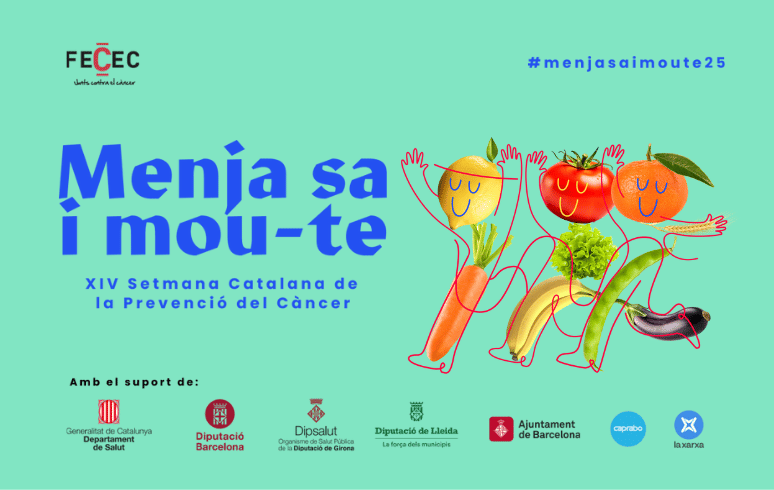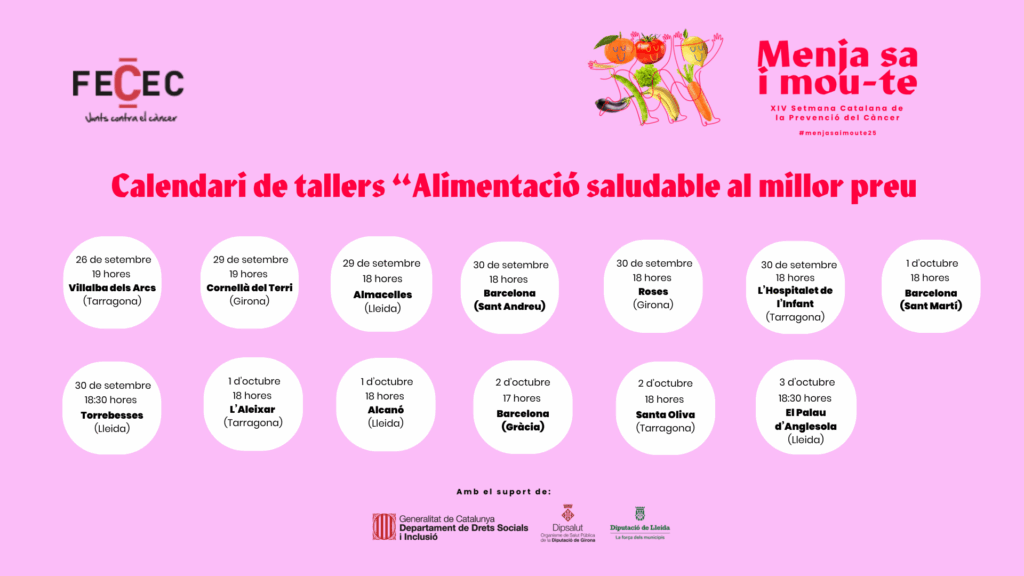La Federació Catalana d’Entitats contra el Càncer (FECEC) is organizing the 14th edition of the Setmana Catalana de la Prevenció del Càncer (SECAPC) from September 26 to October 3. The motto of SECAPC is “Menja sa i mou-te” and its goal is to raise awareness among the population to adopt healthy lifestyles in accordance with the recommendations of the Codi Europeu contra el Càncer to prevent the disease. This year, SECAPC focuses on debunking the myth that following a healthy and balanced diet is expensive.
Goal #menjasaimoute25: healthy eating is not expensive
Among the population of our country, there is still a belief that following a healthy diet is not economical. However, various studies indicate that spending a lot of money to eat healthily can be avoided by following a series of basic tips. For example, choosing seasonal and local products; buying items in bulk instead of pre-packaged; avoiding pre-cooked foods; planning meals before shopping; looking for offers and comparing prices; and freezing products that will be consumed later, among other recommendations.
Specifically, the 14th edition of the SECAPC focuses on debunking this belief and providing the general public with tips and recommendations on how to shop for healthy foods without overspending and while avoiding food waste.
The European Code Against Cancer, in its 5th point, emphasizes the importance of following a balanced diet (rich in vegetables, fruit, cereals, and legumes, and low in sugars, fats, and processed foods) to reduce the risk of developing cancer.
Likewise, the 4th point of the European Code Against Cancer emphasizes that physical activity, regardless of body weight, reduces the likelihood of developing colorectal cancer and, among women, breast and endometrial cancers, which are among the most common in Europe.
It is estimated that, among Europeans, those who follow a healthy lifestyle according to cancer prevention recommendations have an 18% lower risk of developing cancer compared to those who do not follow these recommendations regarding lifestyle and body weight.
Activities of the 14th SECAPC
The #menjasaimoute25 campaign combines a series of in-person activities and online tips from September 26 to October 3. These are the activities of the XIV edition:
- Workshops “Healthy eating at the best price”:
Organized together with the federated entities, they will take place in different towns across Catalonia. The workshops are led by certified nutritionists and dietitians and will cover how to create healthy diets at an economical cost; how to make a healthy shopping list; menu planning based on that shopping; which foods are essential and which are not; how to cook effectively; and how to avoid food waste.
- Social media campaign with healthy eating and physical activity tips:
From FECEC’s social media channels, a series of basic tips will be shared with families to eat healthily at the best price. Likewise, recommendations for engaging in regular physical activity to reduce the risk of cancer will also be shared. These tips are provided in collaboration with the Agència de Salut Pública de Catalunya (ASPCAT).
- ‘L’Hort d’en Marçal’, healthy fruit for children:
The children’s activity “L’Hort d’en Marçal” will reach around 60 Catalan schools to encourage children aged 5 to 7 to eat fruit. Through a video and educational materials, approximately 2,100 children will learn in the classroom about the properties of fruit and will prepare a skewer with 5 different types of fruit, which they will then taste. The goal is to help them develop a healthy eating habit that will accompany them throughout their lives. A team of FECEC volunteers will collaborate in these activities, which are supported by Supermercats Caprabo, responsible for donating the fruit for the workshops.
Apart from Caprabo, the SECAPC, which carries the annual slogan “Menja sa i mou-te,” is supported by the Departament de Salut de la Generalitat de Catalunya, the Diputació de Barcelona, Dipsalut de la Diputació de Girona, the Diputació de Lleida, the Ajuntament de Barcelona, and La Xarxa.

 CAT
CAT ES
ES

